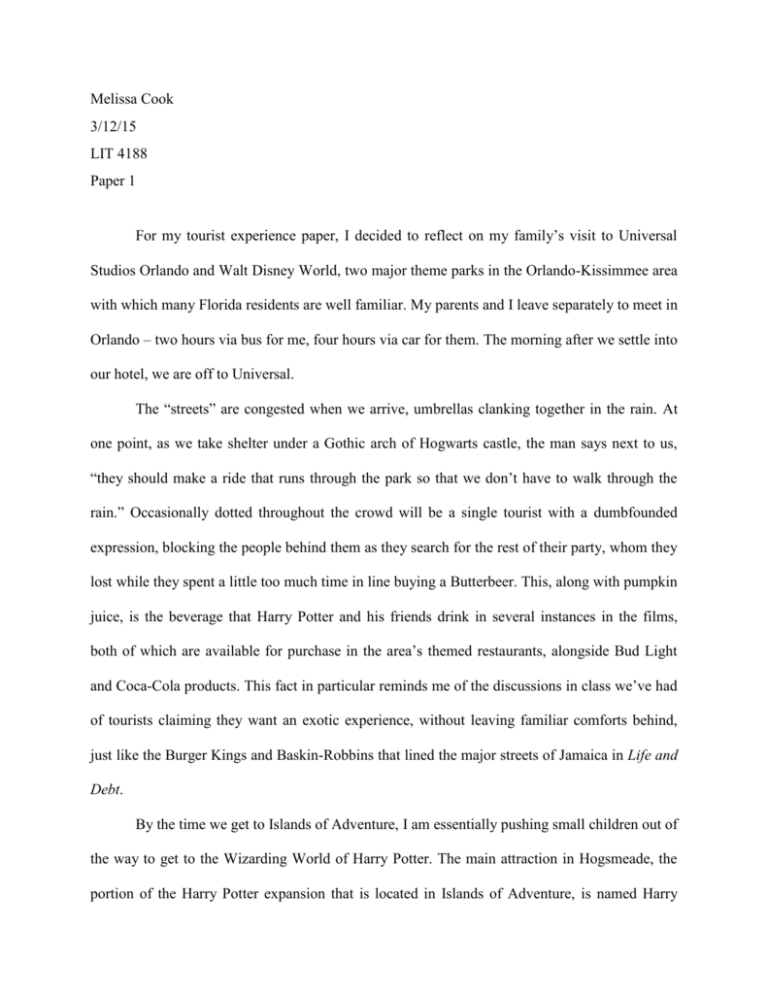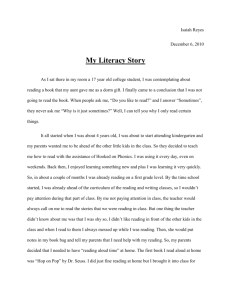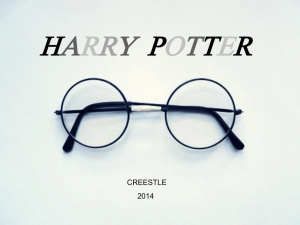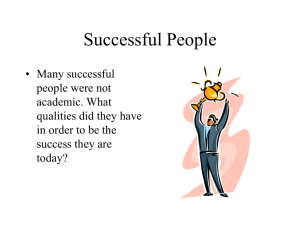Melissa Cook 3/12/15 LIT 4188 Paper 1 For my tourist experience
advertisement

Melissa Cook 3/12/15 LIT 4188 Paper 1 For my tourist experience paper, I decided to reflect on my family’s visit to Universal Studios Orlando and Walt Disney World, two major theme parks in the Orlando-Kissimmee area with which many Florida residents are well familiar. My parents and I leave separately to meet in Orlando – two hours via bus for me, four hours via car for them. The morning after we settle into our hotel, we are off to Universal. The “streets” are congested when we arrive, umbrellas clanking together in the rain. At one point, as we take shelter under a Gothic arch of Hogwarts castle, the man says next to us, “they should make a ride that runs through the park so that we don’t have to walk through the rain.” Occasionally dotted throughout the crowd will be a single tourist with a dumbfounded expression, blocking the people behind them as they search for the rest of their party, whom they lost while they spent a little too much time in line buying a Butterbeer. This, along with pumpkin juice, is the beverage that Harry Potter and his friends drink in several instances in the films, both of which are available for purchase in the area’s themed restaurants, alongside Bud Light and Coca-Cola products. This fact in particular reminds me of the discussions in class we’ve had of tourists claiming they want an exotic experience, without leaving familiar comforts behind, just like the Burger Kings and Baskin-Robbins that lined the major streets of Jamaica in Life and Debt. By the time we get to Islands of Adventure, I am essentially pushing small children out of the way to get to the Wizarding World of Harry Potter. The main attraction in Hogsmeade, the portion of the Harry Potter expansion that is located in Islands of Adventure, is named Harry Potter and Forbidden Journey, in similar fashion to the book and movie titles (e.g. Harry Potter and the Chamber of Secrets). This functions to make the tourist feel as if they are part of the next installment of Harry Potter’s adventures – an odyssey that won’t ever be filmed, there for lines of people to continually experience just for the cost of admission. In the line for the ride, Harry Potter casts a spell that causes it to snow indoors, notwithstanding the loud whir of the machines overhead that occurs simultaneously. The staged authenticity is so mesmerizing here that families will stop entire lines of people to get photos with replicas from books they’ve loved since childhood or movies that they’ve casually watched at home. These parks are meant to be consumed just as movies are consumed. Universal Orlando is marketed as “where vacation becomes adventure” (according to their website), but the statuteregulated health and safety measures under which the park and its attractions operate ensure that there is very little actual risk to the tourist. This diverges from the idea that a tourist location must be depicted as safe for the tourist to temporarily reside in – it would be against the law not to be. Also from Universal’s website is the claim that “here an amazing array of rides, shows and attractions make YOU the star, putting you right in your favorite scenes from your favorite movies and TV shows.”1 The concept of reorganizing the films’ original structures of protagonist, plot, etc., so as to create a new “star” of the story is a concept I consider to be unique to the theme park experience, which attracts a specific type of tourist. When we go to Universal, it happens to be in the middle of the park’s Mardi Gras celebration. A parade roams through the streets of Universal Studios, throwing beads at onlookers (without requiring them to perform the 1 "Rides at Universal Studios Florida®." Attractions at Universal Studios Florida. Universal Studios, n.d. Web. Florida.aspx>. 11 Mar. 2015. <https://www.universalorlando.com/Rides/Universal-Studios- exposing act that customarily gets people beads during Mardi Gras in New Orleans). There is also an area where authentic “Nawlins” fare is to be served – everything from jambalaya and gumbo to beignets is offered. This specific type of tourist to which I refer is not the type to travel to New Orleans – they are the type to travel to Orlando, Florida, to go to a land comprised of convenient, smaller lands, where they also want a simulated New Orleans experience thrown in. This is the same type of tourist that saves up their money for the family vacation fund to go to EPCOT, where they can say they walked through eleven countries and still made it home before dinnertime. There is one point about the experience at Disney that I would like to touch upon. During our trip to Orlando, I thought of the lack of mobility argument in a new dimension while strolling through Magic Kingdom. A policy unique to the workers in this park is that they are not even allowed to be seen in a different “land” in the park (the park is divided into smaller areas, like the spokes of a wheel – Fantasyland, Adventureland, etc.) if their uniform does not correspond with that land’s theme. For example, if a worker is scheduled to work in Frontierland that day, they cannot just simply enter the park and walk there, but are instead forced to travel underground. While this isn’t horribly oppressive -- there aren’t any Disney catacombs of lore that workers are coerced into navigating, trudging through caverns while dressed like Wild West pioneers to get to the turkey leg stand in Frontierland -- it still perpetuates the staged authenticity of each land in the park. You are meant to be in the Wild West, and aside from officially licensed Disney merchandise, there is to be as little stimuli to contradict this information as possible. The cultural ambiguity represented in both Universal and Magic Kingdom was striking to me. Because I intend to go more in-depth of Disney’s portrayal of the Caribbean in my final paper, for the sake of minimizing repetition, I will focus more on Universal Studios herein. The portion of Islands of Adventure that is dubbed “The Lost Continent” blends mythological tales spanning ancient Greece, Oman, and medieval England. This “land” is divided into three segments: the Lost City (inspired by Atlantis), Sindbad Village and Merlin Woods.2 In the gift shop for the Return of the Mummy ride in Universal, there is an entire section devoted to “evil eyes,” or nazars, originally from Turkey and the Mediterranean (i.e. not Egypt. You may recognize these amulets from the “lucky eye” kiosks that are in virtually any decent-sized mall.) With Poseidon’s Fury, park guests are to experience a walk-through ride through a sunken temple dedicated to the Greek god Poseidon, led by our “tour guide,” who is enthusiastic to the point of caricature. He asks a child in the first row where he’s from, and when his mother replies “Jacksonville,” he responds, “Where is that?” When the boy says “Florida” (where, geographically, we are still located), the tour guide remarks at how far away from home he was (because, remember, we were amongst the ruins of ancient Greece). This, again, contributes to the staged authenticity of these parks. Your experience of these adventures is meant to be as realistic as possible, except when you can be further catered to in some manner. For example, in Poseidon’s Fury, the goal is to find Poseidon’s trident in order to escape the temple, which has been sealed off by a dark lord by a spell impervious to magic. Our tour guide finds the trident virtually the same instant he is told to look for it (presumably to not keep the guests longer than the 14 minutes it is estimated for the ride to take on their guide maps), and hands it to the same child from earlier for safe-keeping. The plausibility of pantheistic deities aside, if your life 2 "The Lost Continent - Islands of Adventure." AllEars.net - Sharing the Magic Worldwide. R.Y.I. Enterprises, LLC, n.d. Web. 11 Mar. 2015. <http://allears.net/uni/tp/ioa/lostcon.htm>. supposedly depends on delivering this trident to Poseidon in one piece, you are, realistically, probably not going to entrust it to a seven-year-old who drops right after you hand it to him. Unexpectedly divergent from the countless times I have ridden this attraction in my youth, this time, Poseidon’s Fury actually stopped working as we were on it. This made it so that, just before the final battle between Poseidon and his nemesis, Darkennon, we were escorted out of a clearly lit emergency exit, the bright green signs clearly visible throughout our excursion through this underwater Greek temple (presumably so that Universal can’t get sued). I found that my first thought upon being reintroduced to sunlight was that we should be compensated for our wasted time, with free passes to skip the lines for another attraction, or something to that effect. I felt almost obligated to this. At the precise moment I realized what was happening, I felt no better than the family I’d met under the arch, or the tourists usurping the benefits of their hotel’s no sunshine policy. I felt entitled to experience my vacation a certain way, and expected my travel destination to live up to it.







